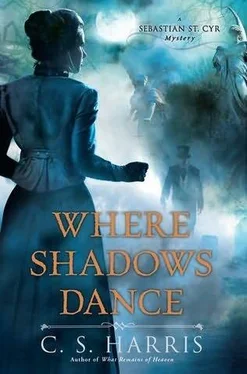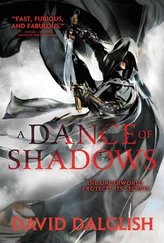His lower lip gripped between his teeth, Gibson went to carefully turn the cadaver on his table onto its side. Reaching for a probe, he shifted the fair hair at the base of the man’s skull. Now that he knew what he was looking for, it took but a moment to find the slit. He watched the probe slide in, following the track left by an assassin’s blade.
“Mother Mary and the saints preserve us,” he whispered.
S ir Henry Lovejoy returned to the Bow Street Public Office after an early nuncheon to find the constable from Bethnal Green awaiting him, a wide grin splitting his ruddy face.
“Constable O’Neal,” said Lovejoy, hanging his hat on a peg beside his door. “I take it you have something for me?”
“Aye, sir; that I do. We checked the pawnbrokers in Whitechapel and Half Nichols Street, the way you suggested. And look what young Jamie Durban sold just last Monday morning.” The constable reached one meaty hand into his coat and drew out a gold pocket watch dangling from a short chain.
“Well, that’s luck,” said Lovejoy, reaching for it. “Is there an inscription?”
“Aye, sir; there is. And we’ve checked with the lad. He confessed to taking the watch from the body.”
It was a rather plain timepiece, its case decorated with only a narrow band of ivy engraved around the outer edge. Flipping it open, Lovejoy read the inscription opposite the face. “For Ezekiel with love, Mahala.” He looked up. “It’s a promising start—assuming of course this Ezekiel is the man whose body we found lying in the ditch beside the green, and not his father or grandfather.”
“It is an unusual name, sir. And here’s the thing: I done some checking, and it seems there’s an American by the name of Ezekiel Kinkaid disappeared from Rotherhithe just last week.”
Lovejoy frowned. “Disappeared?”
“Aye, sir. Had a room at the Bow and Ox near the Surrey Docks, he did. Stepped out for a stroll last Saturday evening and never come back.”
“Saturday, you say?”
“Aye, sir.”
Lovejoy reached for his hat. “Collins,” he said, calling to his clerk. “Cancel whatever appointments I have scheduled this afternoon.” He glanced at the constable. “Interested in coming with me to the docks, Constable?”
The big constable turned a rosy hue. “I’d be honored, sir.”
According to Tom’s investigations, the Swedish trader Carl Lindquist operated mainly in the area of Wapping, where he was known as an importer of timber and furs.
After checking with the man’s offices on Princes Square, Sebastian finally tracked Lindquist to a lumberyard on the banks of the Thames near the Prospect of Whitby at Pelican Stairs, where he was inspecting a new shipment of spruce and pine.
“I am a busy man, Lord Devlin,” said Lindquist, striding along between two towering rows of timber. “Vat do you vant?”
The trader was younger than Sebastian had expected, no more than thirty or thirty-five at the most. Cleanly shaven, with full, flushed cheeks and a thick shock of straight golden hair, he was also quite tall. Too tall for his height to have gone unnoticed by Madame Champagne? Sebastian wondered. He wasn’t sure.
“I understand you knew Alexander Ross,” said Sebastian, keeping pace with him.
“I did, ja .”
“How exactly did you two meet?”
“I vas teaching him to speak Svedish.”
“Swedish?”
“Dat’s right.” Lindquist drew up at the end of the row, his eyes blinking suddenly in the sunlight reflecting off the river. “Vat exactly are you suggesting, Lord Devlin?”
“I’m not suggesting anything. I’m just looking for a possible reason for why Ross was murdered.”
Lindquist’s face went slack. “He vas murdered? Ross? You are certain about dat?”
“Yes.”
The Swede stared out over the crowded river, his nostrils flaring, his chest rising with his quickened breathing. “I vas told his death vas natural.”
Sebastian watched him, curious. “Know anyone who might have wanted him dead?”
Lindquist glanced over at him, pale blue eyes narrowed. “Specifically? No. But ...”
“But?” prompted Sebastian.
Lindquist shrugged. “I should expect suspicion to fall on the agents of England’s enemies.”
“Such as?”
“Why, the French, of course.”
Sebastian smiled. It was, after all, Antoine de La Rocque who had given him Lindquist’s name. He said, “Thinking of anyone in particular?”
“I’ve no dealings with the French, if dat’s what you mean.”
“All right. Who else besides the French?”
“The Danes, I suppose.”
Inwardly, Sebastian groaned. The last thing he needed was to find himself involved with yet another diplomatic mission. “How about the Austrians?” he said wryly. “Or the Prussians?”
Lindquist considered the suggestion, then shook his head. “Ross never had any dealings vith dem. At least, not dat I know of.”
Thank God for that , thought Sebastian. “When was the last time you saw him?”
The Swede puffed out his cheeks. “Oh, probably not since the beginning of the month. I’ve been busy, you know. But I remember ve had a tankard of ale together at the Blind Beggar, in Whitechapel, a few veeks ago. Interesting old building; you know it?”
“I’m familiar with the place. Did Ross seem troubled by anything when you saw him?”
“Not so’s I vas aware, no. He vas a cheery lad, you know. Not much could get him down for long.”
“He never mentioned any problems he might have been having? In the Foreign Office, for instance?”
“No, no. He didn’t talk to me about dat sort of thing.”
“How about his fiancée, Miss Cox?”
The Swede started to shake his head, then hesitated.
Sebastian said, “What?”
“Vell, I don’t think he got on de best vith her brother. But I vouldn’t vant to make too much out of dat.”
“He’s a merchant, isn’t he? Deals in timber and furs and wheat.” Sebastian paused a moment, then added, “Like you.”
The Swede chuckled. “Cox is one of the wealthiest men in London. Me? I’m yoost a small-time Svedish trader. My father’s a vicar, in Uddevalla.”
“But you know Cox well enough to know that you don’t like him,” Sebastian said.
“You’d be hard-pressed to find anyone along the vaterfront who doesn’t have an opinion of Cox.” Lindquist started to turn away. “Now you must excuse me, my lord. I have vork to do.”
“Just one more question. Where were you the night Ross died?”
The Swede glanced back at him. “I vas home. Alone.” His brows drew together in a frown.
“What is it?” said Sebastian.
“I vas yoost thinking . . . I know dat Ross had recently got himself mixed up vit something that had turned out to be more than what he’d bargained for. Some Americans—an older man and a young woman—who’d come here, to London. Something to do vit the impressment of the man’s son. But I don’t remember his name.”
“You mean Nathan Bateman?”
“ Ja , dat’s it. Nathan Bateman.”
Clad in an old-fashioned frock coat, breeches, and a long waistcoat stained with spilled snuff, the aged American sat on a bench in the churchyard of St. Pancras. His name was William Franklin, and he was an old man now, in his eighty-second year. Once, he’d been His Majesty’s Governor for the Colony of New Jersey. Then had come revolution and imprisonment, followed by estrangement from his father, the death of his first wife, and endless decades of exile from the land of his birth. For years he had devoted much of his time to helping his fellow Loyalists in their struggles to receive compensation from His Majesty’s government. That, and caring for his granddaughter, Ellen, a plainfaced child who grew to resemble her famous great-grandfather, Benjamin Franklin, more each day. Now William Franklin could usually be found here, near the grave of his beloved second wife, Mary.
Читать дальше












